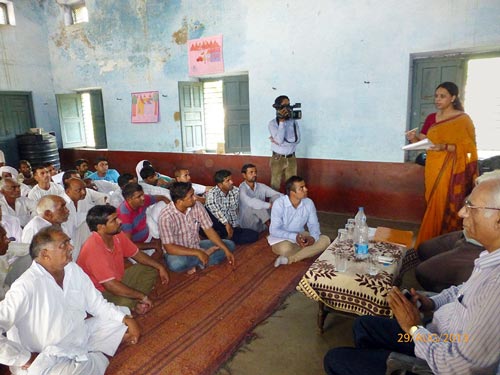Climate-Smart Villages (CSVs) in Haryana, India, are prioritizing and promoting climate-smart agriculture (CSA) interventions. Through the work of CIMMYT and its partners, the CGIAR Research Program on Climate Change, Agriculture and Food Security (CCAFS) is promoting CSA interventions through CSVs in India and South Asia.
A planning workshop titled “Mainstreaming and scaling-out climate smart agriculture interventions in Haryana” was held on 27 May to promote climate-smart agriculture practices to benefit farmers. The workshop also addressed the emerging challenges of water scarcity and degrading soil health through promoting direct seeded rice (DSR), no till and diversification of ricewheat systems by introducing maize. Participants focused on daunting challenges in the agriculture sector. Topics included:
- The promotion of CSA through techniques like laser-assisted precision land leveling and tools for precision nutrient management tools such as the GreenSeeker and Nutrient Expert software. The pedoclimatic and socio-economic condition of farmers including market demand, presented by CIMMYT’s Santiago López-Ridaura.
- An action plan to disseminate soil fertility information for informed decision-making on nutrients and fertilizer application was presented by T Satyanarayana, Deputy Director of the Internal Plant Nutrition Institute.
- Developing a joint action plan between CIMMYT and the state department of agriculture for the 2014 monsoon season to implement CSA practices. DSR and maize promotion in Haryana. The roadmap emphasized diversification through maize.
- Precise nutrient management for capacity building and training needs on precision nutrient management and DSR was laid out for 10 districts of Haryana.
In order to mainstream climate-smart villages, there is a need to identify, adapt and evaluate demand-driven CSA interventions aimed at improving the adaptive capacity of rural livelihoods to climate change. Other priorities include identifying target domains for CSA interventions; designing, monitoring and evaluating the processes to integrate and deliver CSA interventions to facilitate up-scaling and out-scaling beyond the CCAFS CSVs; innovative business models for CSA interventions; capacity development; and promoting policies that help farmers better adapt to climate change. Capacity building, training on new technology and dissemination of agro-advisories through voice messages are features of the CSVs in Haryana.
The benefits of CSVs are already clear, though policy implementation and technological gaps hinder information dissemination and adaptation. With due time and effort, the CSVs in India will transform agriculture and sustainable development. The meeting was chaired by Suresh Gahalawat, Joint Director Agriculture, Government of Haryana and was organized jointly by the State Department of Agriculture, the Government of Haryana, CIMMYT-CCAFS, CSSRI-NICRA. The key stakeholders involved were PC Sharma from CSSRI; RK Sharma, DWR; DK Sharma, CSSRI; Pawan Sharma, DDA, Karnal and other deputy directors of agriculture from different districts of Haryan.
 Capacity development
Capacity development 